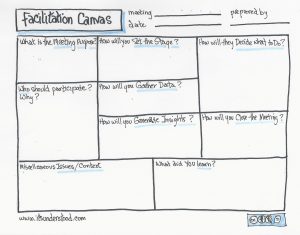 “Half (of the meetings I attend) are completely bizarre and accomplish nothing except bewildering me as to why people don’t run out screaming.” That’s a real quote from a real person about real meetings. Yes, it’s sad. It showed up in an informal survey I did some time ago. Folks told me they spend approximately 40 per cent of their time in meetings, a number consistent with data Perlow, Hadley and Eun found in their 2017 Harvard Business Review Article, “Stop the Meeting Madness.” The authors also found that:
“Half (of the meetings I attend) are completely bizarre and accomplish nothing except bewildering me as to why people don’t run out screaming.” That’s a real quote from a real person about real meetings. Yes, it’s sad. It showed up in an informal survey I did some time ago. Folks told me they spend approximately 40 per cent of their time in meetings, a number consistent with data Perlow, Hadley and Eun found in their 2017 Harvard Business Review Article, “Stop the Meeting Madness.” The authors also found that:
– 71% felt that meetings waste their time
– 65% said meetings keep them from doing their real work
– 66% claim meetings inhibit spending time on deep thinking
Calculate the hard cost of bringing minds together to explore issues, make decisions and plan action. It’s often thousands of salary dollars for a one-hour meeting. (And that doesn’t count travel, doughnuts or the opportunity cost when we delay getting to our other work.)
Then ponder another response, from my survey. “We can’t make decisions or agree on priorities. So, we have the same meeting over and over. Literally, the same meeting.” 
Imagine if every meeting you went to felt like a good investment of your time. It can happen. Good facilitation enables conversations that lead to good decisions. It requires planning – a whole lot more than finding a conference room and sending out a meeting notification.
The first step is identifying the purpose of the meeting, the desired outcome. That leads you to determine who needs to be there – really – and what they need to provide or do. How will you engage people? How will you gather information, analyze it, decide what to do and follow up? All this should be planned before the meeting.
That’s Plan A. You’ll need a Plan B, too, since humans are involved. And you’ll need to be ready to change your plans. Still, to go into meeting a without a plan is almost guaranteed to be a time waster. The more thought and time you invest in planning the meeting, the more relevant and useful the discussion will be – for you and for the participants.
Given that today’s working environment requires collaboration, teamwork and communication, learning to facilitate well may be the most important skill for the 21st century. A facilitator doesn’t do magic. It just looks that way.
+++++++ At It’s Understood Communication, we care about facilitation. Facilitation Skills for the Agile Workplace is a two-day workshop that offers a solid foundation in facilitation, including using visual thinking to build clarity and understanding. Ellen Grove and Sue Johnston are offering it in downtown Toronto, May 6-7, 2019. There are still a few spots left. To learn more and register, visit nobadmeetings.ca At that site, you can also download a PDF copy of our Facilitation Planning Canvas.
